CHARLOTTE MASON'S FIRST PRINCIPLE:
Children are Born Persons
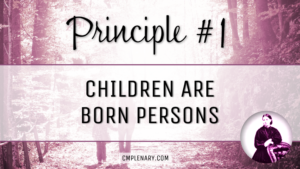
The first step in finding your way to the homeschool you’ve always wanted is stepping back and looking at the BIG picture…
Part of that “big picture” in a Charlotte Mason homeschool includes the PRINCIPLES.
This is the first post in a series about Charlotte Mason’s 20 Principles. Over the next few months, I’ll be taking an in-depth look at each individual Principle.
Here’s how it will work.. every two weeks you will get:
- Blog post about a new Principle
- YouTube video to go with it
- Free Study Guide as a PDF download
- Facebook Group chat
You can watch, or read, or both, and then – yay! We get to discuss! Join me in The Plenary Facebook Group to discuss the Principle and ask your questions. I love chatting and hearing different perspectives! Plus, we get to build community and support each other in our efforts to be better parents and better homeschoolers.
So let’s get started! You can access the video and the PDF Download for Principle #1 here:
Video for Principle #1
DOWNLOAD YOUR FREE
20 PRINCIPLES STUDY GUIDE
PRINCIPLE #1: CHILDREN ARE BORN PERSONS
This is my favorite principle and I love that Charlotte lists it first. She has a whole chapter about it in Volume 6: A Philosophy of Education, aptly named “Children are Born Persons!” The whole unabridged chapter is provided for you in the PDF download above.
Charlotte opens the chapter with two quotes by Benjamin Whichcote:
“No sooner doth the truth …. come into the soul’s sight, but the soul knows her to be her first and old acquaintance.”
“The consequence of truth is great, therefore the judgement of it MUST NOT be negligent.”
I always find it fascinating who Charlotte chooses to quote… it’s like a little clue to help you figure out the deeper meaning of what she is saying. So why did she choose Whichcote? And why place this quote even before her own words?
Well, Whichcote was an English theologian and philosopher who lived in the 1600s. He was an advisor to Oliver Cromwell and he believed in religious tolerance. To me, that’s an important clue.
He is also known for the saying:
“Knowledge alone doesn’t amount to Virtue, but certainly there is no virtue without Knowledge”
Charlotte says we shouldn’t be surprised that this chapter begins with such weighty words because she designed this chapter “to set forth a startling truth” as a reminder to us because “truths get flat and wonders stale upon us.”
Let’s think about this idea of “a startling truth” for a moment. What do you think it means, this truth that Children are Born Persons? Does this idea startle you? And what makes it “true”?
THE VERY FIRST "FIRST PRINCIPLE"
The original idea of a “First Principle” comes from Aristotle. In his philosophical writings, Aristotle says he is continually looking for those “first principles,” the origin of a thing or of an idea.
He defined a “First Principle” as “the first basis from which a thing is known.” It is a basic, foundational, self-evident truth.
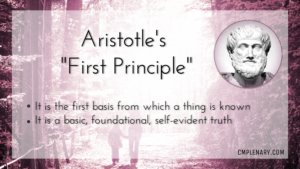
A SPARK, A SOUL, A LIFE FORCE
So when Charlotte says that her VERY FIRST Principle is “CHILDREN ARE BORN PERSONS,” I think she is saying that we must look for that foundational truth… that every person is born with a SPARK inside of them.
Now, there are many words to describe this spark, Divine or otherwise. Whatever spiritual background you come from, every teaching gives it a name: a Soul, a Light, a Consciousness.
The Hebrew word for soul is Nephesh. It can be translated into English in several ways… it can mean “living being,” “breath,” or even a person’s “life force.”
I love that last translation: LIFE FORCE. It speaks to me… and it also reminds me of the line from Star Wars, “Use the force, Luke.” Yes! Exactly! RECOGNIZE the life force! HONOR the life force! (We are big Star Wars fans here in my house, but I digress!)
The Sanskrit word Prana also means life force or energy and there is another Sanskrit word that I also love: Namaste.
You’ve probably heard namaste as it is connected with yoga. It is used as a greeting or a parting word. I always thought it simply meant “peace,” like the word Shalom.
My friend Meredith is a Yoga instructor and one day she told me the definition of the word namaste:
Isn’t that beautiful? I IMMEDIATELY thought of Charlotte’s Principle #1!
It is the recognition that every PERSON is the perfect expression of the divine consciousness.
A quote from the Deepak Chopra website describes the idea of namaste this way:
“It is one thing to conceptually understand this philosophy, but it is another to feel it in your bones. To know this teaching as a truth is both the aim and the way.”
“Children are Born Persons” is both “the aim and the way.”
This idea, this truth, is what we are “aiming” for AND it is “the way” to understanding and implementing the method, because if you don’t “feel it in your bones,” then the rest of the Principles will fall flat.
Charlotte is also saying that children are BORN with this life force that makes them a whole person. They do not acquire it. There is no “Nature vs. Nurture” argument here.
We are BORN with it. It is SELF-EVIDENT and this Self must be RESPECTED.
Put simply, treat others as you would want yourSELF to be treated. And that applies to CHILDREN.
DOES OUR SOCIETY HONOR CHILDREN?
How does our society treat children? As a whole, I’d say not very well. I think we often offend a child’s dignity without even realizing that we are doing it.
The rule that I have always tried to go by is this: I ask myself
“Is this how I would treat another adult?”
- Would I yell and scream at another adult?
- Would I walk away from an adult who was crying, who needed comforting?
- Would I belittle another adult or constantly tell them all the things they are doing wrong?
And if I did, would I get a positive result?
I’m not trying to make you feel bad here because we are all guilty of some of these things! Have I ever yelled at my kids? Of course I have! But I hope that I have gotten better about it over the years.
“Because when we know better, we do better.” ~Maya Angelou
So I started asking myself:
If the answer is no, then I need to rethink my actions.
Whether it’s yelling at them or underestimating them or constantly nit-picking (ahem… I tend to do that a lot) –
These are the things we need to consider when interacting with children.
Does THIS action – whatever it is I’m doing –
does it preserve the dignity of this child?
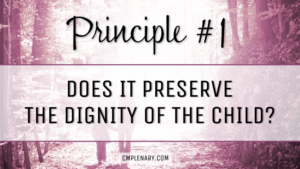
APPLYING "CHILDREN ARE BORN PERSONS" TO EDUCATION
That’s MY take on what I think Charlotte means when she says Children are Born Persons.
But how do we apply that to education?
Let’s look at some of Charlotte’s wise words from Chapter 2. She says that a child’s “mind is the instrument of his education” and that “his education does not produce his mind.”
Charlotte is saying that a child is born ready to learn. He uses his MIND to fulfill his purpose here, NOT that his education is what fills his mind. He is not an empty vessel to be filled or clay to be molded. He has everything he needs from the moment he is born.
But still, we tend to under-estimate children. Oftentimes we don’t think they can do it! She says a teacher’s “error is rather want of confidence in children. He has not formed a just measure of a child’s mind and bores his scholars with much talk.”
But once we UNDERSTAND this Principle, we realize our own inadequacy to “teach” as we currently do – with a system, and not a method.
In a SYSTEM, we lecture, we spoon-feed, we cajole, we bribe with trinkets and rewards.
We turn learning into something that is done TO THEM. We tell the child that he has to follow the RULES and CONFORM to the system – a system that usually kills his NATURAL love of learning.
We forget that learning is NATURAL to a child and that learning for the sake of learning IS the reward.
A METHOD brings us back to the NATURAL way of learning.
And the FIRST step is the realization that children are due the respect of any other person.
Charlotte says:
“Place a teacher before a class of persons… and he will say, ‘What have I to offer them?’ His dull routine lessons crumble into the dust they are when he faces children as they are.”
I love that last part: “when he faces children as they are.”
Once you do that, then this realization alters our “whole outlook on education.”
If we understand this First Principle – suddenly we are once again in awe of the child and we are able to see in him “all the infinite possibilities” that he is born with.
We understand that we have been entrusted with the education of a soul, a nephesh, a life force.
And now we approach everything differently:
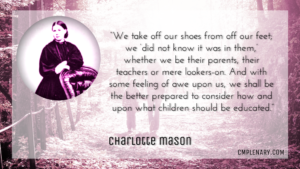
Suddenly, workbooks and spelling lists are no longer adequate. We want MORE for our children! Charlotte says
“Our business is to give children the great ideas of life, of religion, history, science; but it is the ideas we must give, clothed upon with facts as they occur, and must leave the child to deal with these as he chooses.”
We must give the great IDEAS of life – the NOBLE ideas. But how do we do that?!
We’ll get to that in later Principles! ;)
YOUR HOMEWORK FOR PRINCIPLE #1
HOMEWORK! Yay!
Please download the PDF and read Chapter 2. Then, over the next two weeks, keep this Principle foremost in your mind.
View your children (or anyone for that matter) through this lens – that they are born persons. Even when they annoy you or give you attitude, really try to SEE your child’s dignity and honor their light. Ask yourself:
Does it preserve the dignity of this child? Does it HONOR them?
If you have any questions or comments, please post them here or in The Plenary Facebook Group.
Tell me what you think about Principle 1! I would love to hear your perspective! Chatting about it with the Plenary Tribe is the BEST part! And If you are enjoying this study, please share it with your friends.
I hope to chat with you soon!
Other Posts in This Series:
Finding Your Way with Charlotte Mason's 20 Principles
Introduction
Principle #1
Principle #2
Principle #3
Principle #4
Principle #9
Principle #10
Principle #11
Principle #12
Principle #13
Principle #14
Principle #15
Principle #16
Principle #17
Principle #18
Principle #19
Principle #20
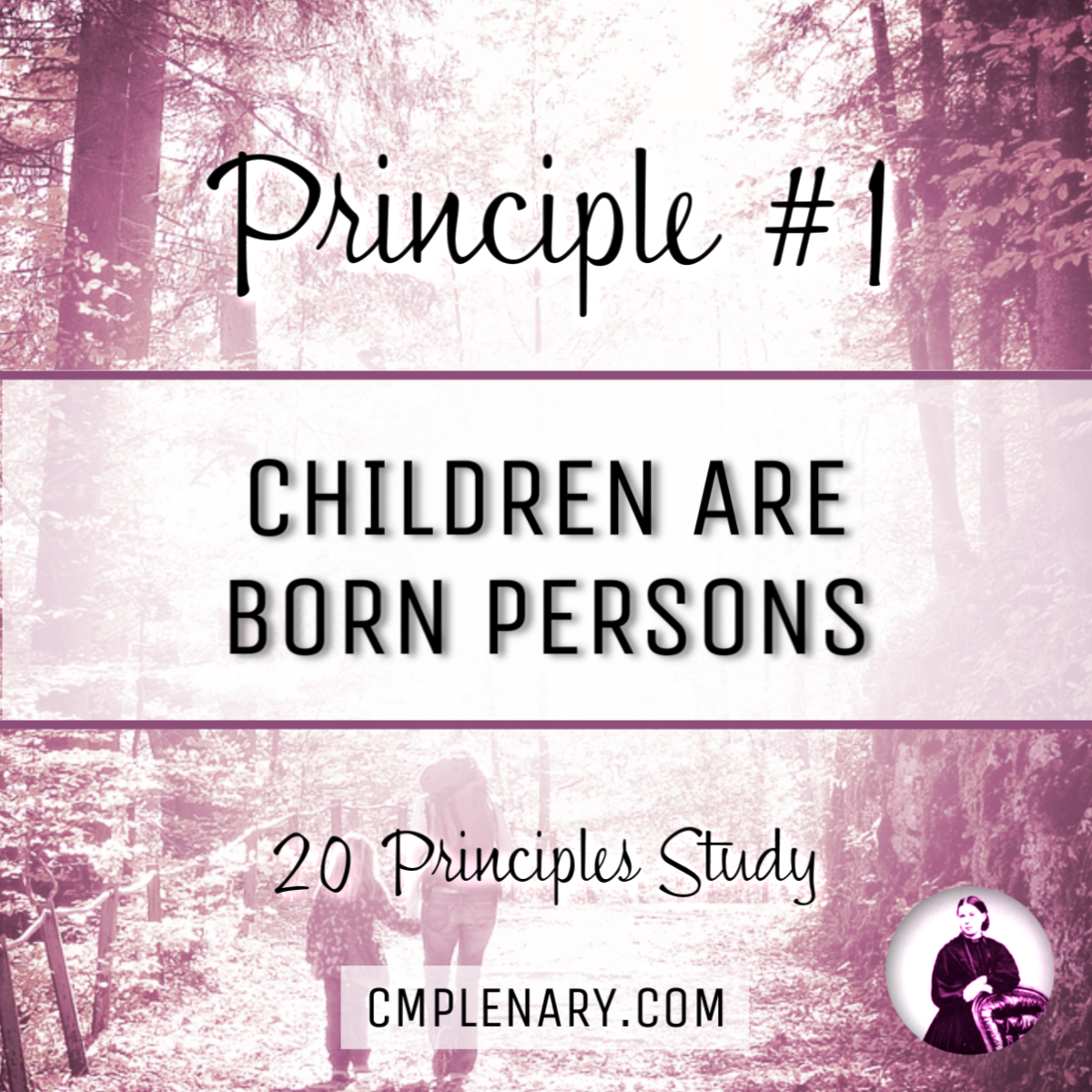
0 Comments for “Charlotte Mason’s Principle 1: Children are Born Persons”